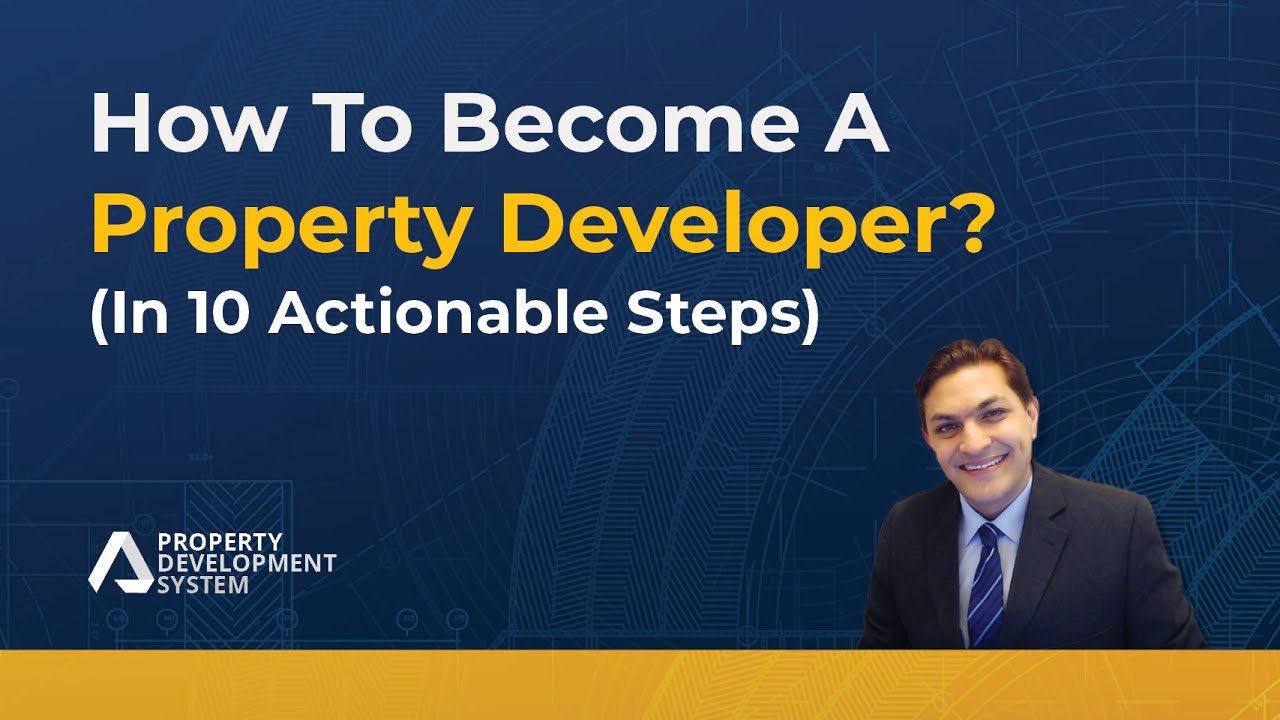How to become a Real Estate Developer without a degree or experience?
To become a real estate developer, you must be an entrepreneur who understands the complete real estate development process and related financial and development issues. Possess knowledge and skills to conduct financial feasibilities, due diligence, organize development finance, set up development entity structures, conduct market research and understand real estate economics, i.e. the impact of economic parameters on real estate prices.
Don't let any of this scare you because I break down everything on this website and in my property development courses for you, step by step…
So before we find out how to become a real estate developer, I think we should first understand…
What is Real Estate Development?
With no barriers to entry, real estate development is now accessible to anyone & everyone. Even Mum and dad, real estate investors, can use development as part of their real estate investment strategy to grow their real estate portfolios exponentially.
You are the FORCE

If you are a real estate developer, you are the FORCE that makes things happen and to realise your vision and your project; you must lead everyone involved with your project. You might be in the project by yourself, but it's still your job as a leader to lead your team of consultants, agents, contractors, etc., to complete the project.
From lenders, finance brokers, landowners, architects, and consultants to state revenue offices, lawyers, investors, buyers, and many others. All these people come together to form your team.
Being in the hot seat and a leadership position, you are expected to specific deliverables and responsible for managing, guiding, troubleshooting, supervising, negotiating, advertising, and much more.
To carry out all these attributes with no or minimal possibility of error, you need to be sure about what you want. You need a plan and a vision to lead and guide others working with you.
How to become a real estate developer?
Two Main Things Will Guide Your Real Estate Development Journey:
- A Strong Mindset and
- A System
How to become a real estate developer? In 10 actionable steps
4 Must haves for any real estate development project
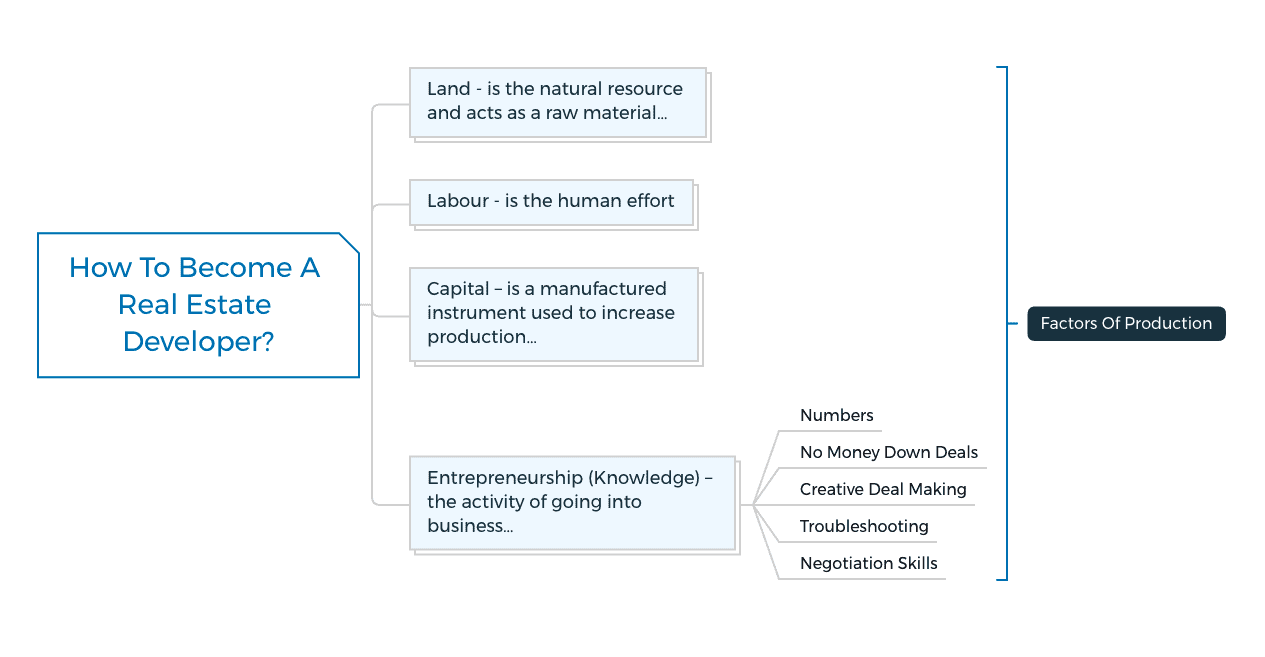
- Land - is the natural resource and acts as a raw material…
- Labour - is the human effort
- Capital – is a manufactured instrument used to increase production…
- Entrepreneurship – the activity of going into business…
This is where you and I come in and this is how we earn profits…
And we do that by simply bringing together land, labour and capital…
You are missing out if you haven't yet subscribed to our YouTube Channel

We've answered every possible Property Development FAQ for you at Edge.
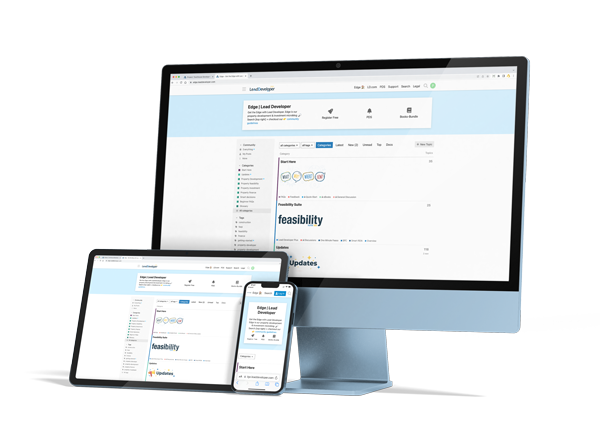
Step 1: 👉 Beginner Property Development FAQs
Step 2: Get the Edge - Register Free
How to become a developer - Real Estate?
Think Of Real Estate Developers As Orchestra Conductors…

Think Of Real Estate Developers As Orchestra Conductors…
Fact…
Since the mid - 19th century, most conductors have not played an instrument when conducting…
Conductors, however, do have to know the limits of each instrument…
We as developers are no different, we do need to know the system…
And how everything comes together…
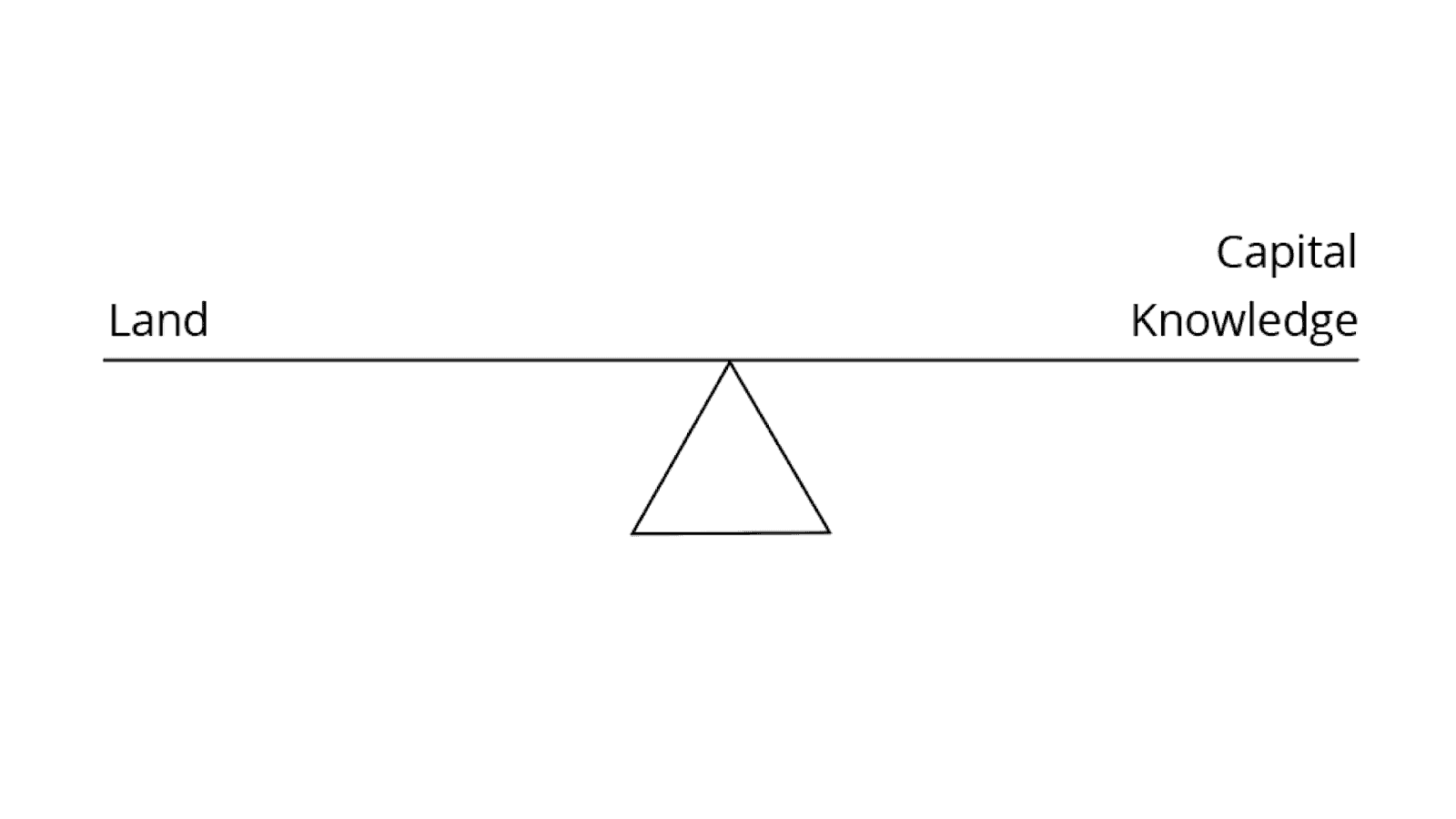
If you have land – you still need capital & knowledge…
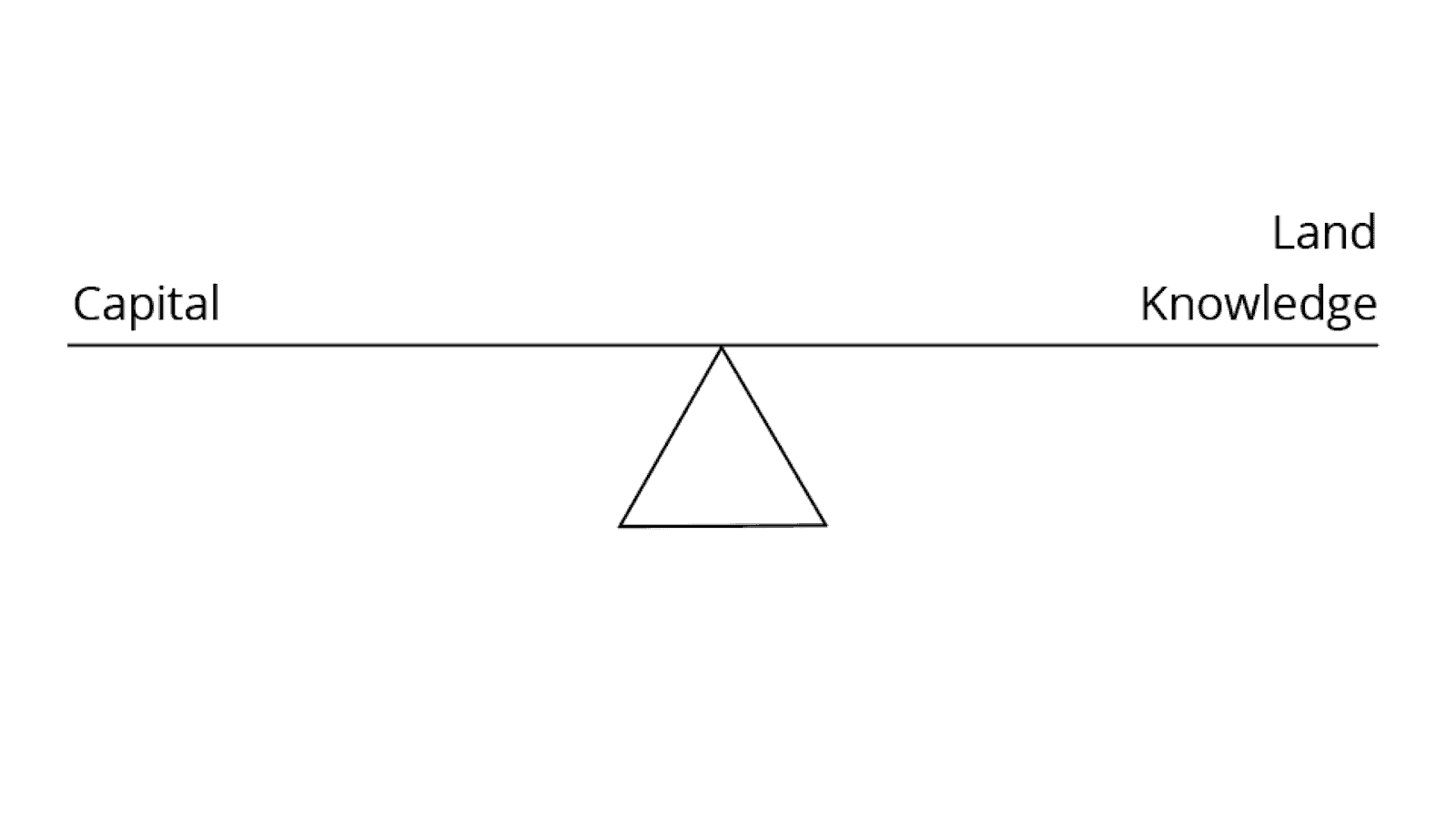
If you have capital – you still need to find the right site & have the knowledge to do so…
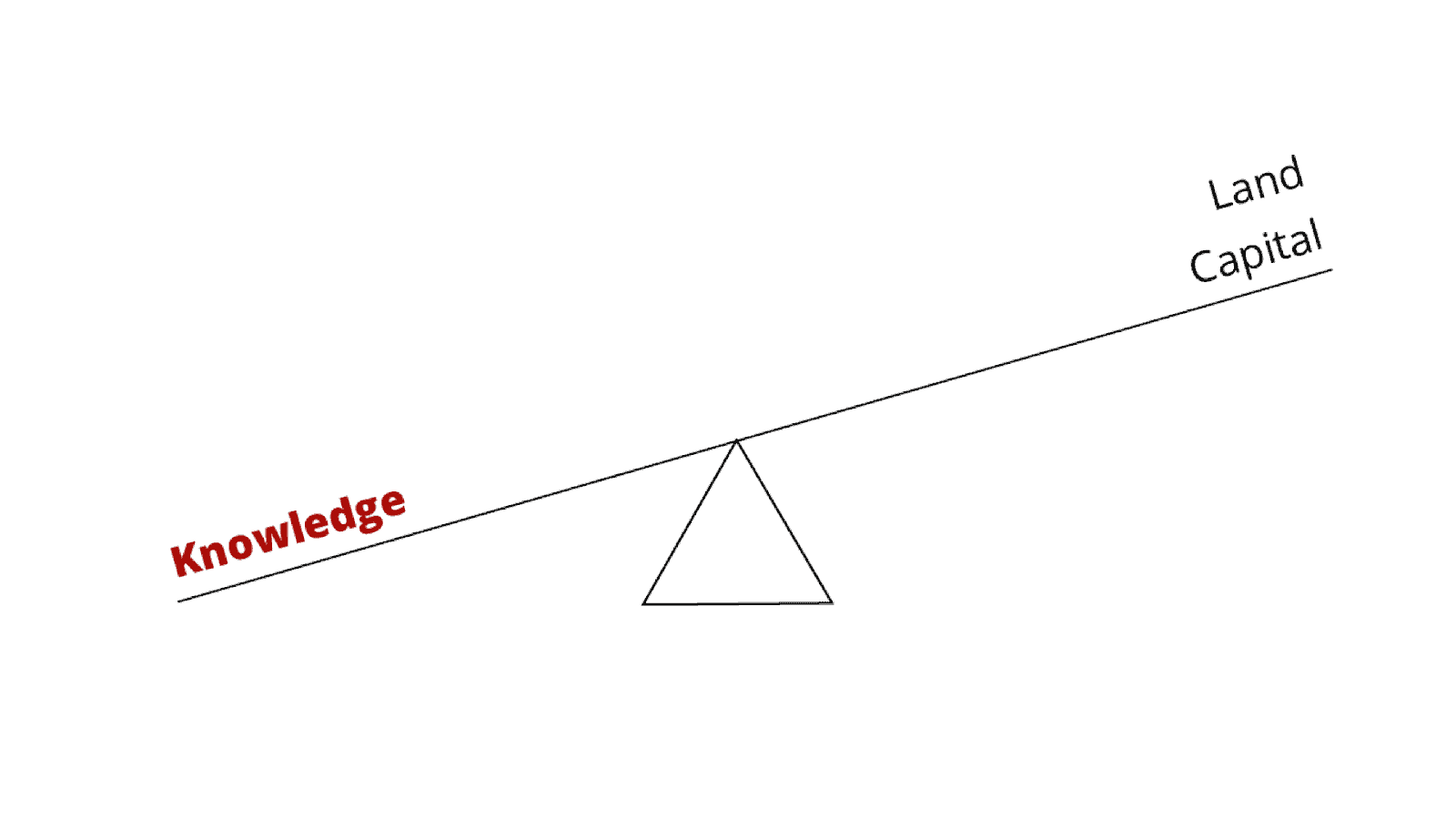
However, when you have the knowledge….
You will know where and how to find the capital and your first site for your first development.
Have you ever seen advertising of a real estate guru promising you their secret sauce, the confidential property marketing strategy, and little-known loopholes that give you an edge in your investment journey?
Here's the real problem, you want to make money from real estate, you want to find lucrative real estate development deals, flipper deals, "get in" - "get out" deals - but so does everybody else.
To make matters even worse, every time you attend these seminars, a thousand people are fighting to find the same deals you're out there every day trying to get.
This means that not only is it harder for you to be able to find lucrative deals, but also the deals you do find are getting thinner because all these newbies are willing to pay more money for the same site, whether or not it even warrants that kind of money. So all the profit is gone out of the project before you have purchased the site.
If you undertake my flagship property development course, you will know the mechanics behind making sure that you never pay for land more than it's worth.
It shows you how to find deals and VET potential projects in under a minute before anyone even knows there was a deal to be had. It shows you everything from inception to banking your profits, all packaged in my Real estate Development System.
For now, I want you to know that there are no secrets & there is no secret sauce. What will give you the edge is this ONE SKILL that everyone knows about, but neither do people fully understand nor pay attention to it.
And real estate gurus skim through it - so they don't have to answer some hard questions. Even after spending thousands of dollars, none of the seminars I went to taught this ONE SKILL correctly.
So if you have been going to seminars and have come out scratching your head, know that it's not your fault; most real estate gurus don't have this skill themselves.
I explain various real estate development and marketing strategies in my property course called Property Development System, along with this ONE Skill that can catapult you to the top of the world without prior experience and, in some cases, almost overnight (well, not quite - but it can result in just one deal)
So remember, that's all it takes…
You are one deal away from becoming a real estate developer…
And by the time you finish Property Development System, you will have the knowledge and the tools at your disposal to be able to do so.
Your success will boil down to three things:
A Good System
Your willingness to take action & follow the system
And the money you have to invest
A Good System
If you want to find great deals...
And if you're going to find deals before anybody else...
And you want to create a steady stream of income doing deal after deal; then you need to have a system that you can follow to a tee, without fail & do so over and over again without thinking.
A system that not only tells you "what to do",
but also shows you exactly "How-to" do it.
Here's the truth, NO ONE HAS COMPLETE KNOWLEDGE - it is impossible. However, having as much knowledge as you possibly can is paramount. You will get hit, the day you start thinking that you know everything. However, as long as you continue to invest in your mind, you will always have & maintain your edge.
When I started, I was obsessed with knowing everything and my hunger hasn't yet subsided. I read books & took courses in real estate development, real estate investment, finance, asset protection, taxation, investment funds, capital raising and everything related that could give me an edge. I got so obsessed with numbers that I took two separate courses in financial modelling.
Types of real estate developers
You may come across many real estate developers in the real estate industry. To help understand the different types of real estate developers, I've divided them into three categories based on their business goals:
1. Private-sector real estate developer
As you begin your real estate development career, you may find yourself as a private-sector real estate developer. You charge and receive a developer's fee while working on your development project, which is often dependent on the total development costs of your project. You will earn a reversionary profit on the sale of the project and your development fee.
Because there is no cash flow from the project during development, the development fee you earn is mostly used to cover your administrative expenditures, food, and living expenses.
Your reversionary profit on the sale of that project will account for the majority of your earnings.
The developer's fee, which is larger than the private-sector developer's, is the primary source of revenue for not-for-profit real estate developers. The explanation for this is straightforward. The projects that non-profit developers work on will not have a direct stake (ownership).
They have no right to receive reversionary profit from project sales. As a result, the developer's fee serves as an incentive for not-for-profit developers, with both positive and negative features.
The private-sector real estate developer stands to profit handsomely from the completion of a project; as a result, the private-sector property developer takes a great deal of risk to reap that profit. On the other hand, there are no guarantees that a private-sector developer will be able to raise funds.
2. Not-for-profit real estate developer
The non-profit real estate developer benefits from working in a niche market of mostly privately operated hospitals and schools. These non-profit organizations, on the other hand, are self-funded by annual allocations. As a result, if the not-for-profit client runs out of money during a fiscal year, the not-for-profit developer may not be paid until the next fiscal year.
3. Public-sector real estate developer
Unlike private-sector developers, public-sector developers only earn a developer's fee and are not entitled to a reversionary profit.
Public-sector developers, like non-profit developers, work in a niche market, constructing hospitals, schools, and government facilities.
The construction of these structures requires a high level of expertise, and the project volume is small. As a result, a real estate developer in the public sector can do fairly well. Furthermore, the public-sector developer has a rating government as a client, for which he will be compensated.
What does it take to be a successful real estate developer?
No one can become a successful developer overnight. Their success results from a combination of education, attitude, experience, instinct, and receiving the appropriate counsel.
With the continual changes in the real estate sector, property professionals must stay one step ahead of the game to take advantage of new opportunities or adjust their strategies to reduce risk.
If you want to work in development, you'll need a thorough awareness of the market, solid financial support for financing property development, a thirst for knowledge, and a high level of dedication.

Get The Edge Now!
Discover the transformative power of our FREE EDGE platform and
unlock a world of opportunities at no cost!
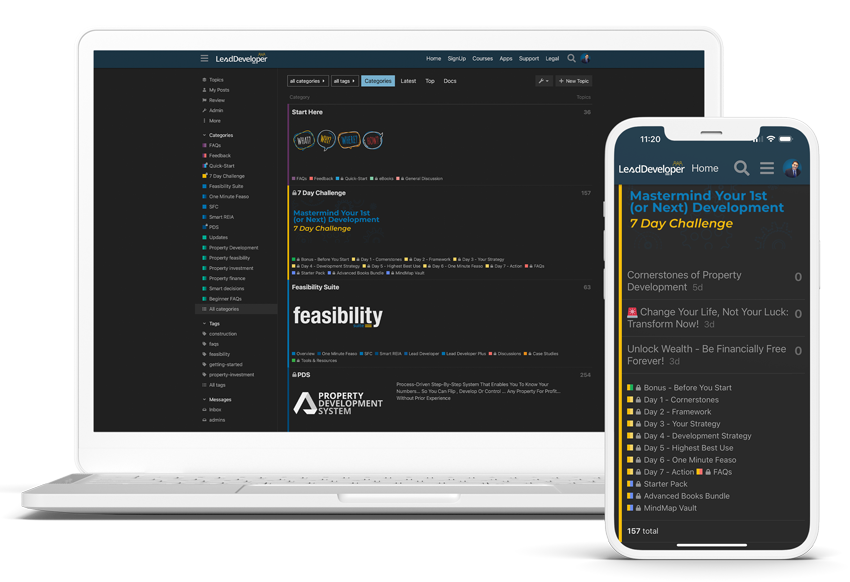
Your Real Estate Toolkit Awaits!
Free eBooks, Courses & Feasibility Suite Trial—Join Today!
✓ Unlimited FREE Trial: Experience the full power of our Feasibility Suite with hands-on demos
—explore without limits, no time pressure & without commitment or credit card!
✓ Learn from Success: Dive into real-life case studies for practical insights.
✓ Engage, Inquire, and Innovate: Ask questions, request features, and engage in lively discussions.
✓ Showcase Your Projects and Gain Insights: Share your projects and get personalised feedback.
✓ Free Resources Galore: Access a treasure trove of free resources,
eBooks & courses to keep you informed.
✓ Exclusive Training: Enjoy members-only training to sharpen your skills.
Characteristics of successful Real Estate developer
Before you jump into the game of development, be honest and ask yourself the following questions:
- Do you have the necessary skills and experience to take on real estate projects?
If not, you need to explore and develop the 8 skills required for real estate property developers.
- Is it feasible for me to take time off from my regular employment to manage the new building?
Below are some crucial characteristics that are a must for a real estate developer...
Know yourself
Because property development can be divided into numerous categories, it's critical to understand your restrictions before starting a project.
Your financial resources, understanding the sort of development, a network of advisers, and knowledge of the local conditions are just a few of them.
Furthermore, do you have the ambition and determination to complete the project? Do you have a strong desire to pay attention to minor details? You will reap the benefits of your efforts if you plan well and visualize your outcome.
Become a specialist
You must become an expert to become a successful real estate developer. You must gain as much industry expertise as possible to earn this status.
This does not necessarily imply that you must return to school and study for several years. Reading books about property development and investment is one of the practical options.
Read your local newspaper's real estate section, attend seminars, join local industry associations, learn to network with individuals in your property circles, query industry experts or professionals, and, most importantly, learn from your own experience.
Knowledge is power, and with it, you'll be able to make well-informed decisions and reduce risk in whatever project you're working on.
There is another easy alternative. Just enrol in one of my property development courses, and you will be on the way to becoming a real estate expert.
Take calculated risks
There is no such thing as gambling in property development, which means that every decision you make is scrutinized before taking action.
Consider both good and bad aspects. By anticipating potential problems, you will be better prepared to prevent them. Take a sheet of paper, list the negatives on the right and the positives on the left.
If the advantages outnumber the concerns, you should be able to move forward with confidence. You will need to address the destructive aspects first before moving further.
Increase your options
Property development is a dangerous business, and being adaptable is an excellent way to protect yourself. Never become emotionally attached to any project you're working on.
If things don't seem to be going your way, especially from a business standpoint, be ready to walk away from a project.
If you've spent a lot of time and effort refining a notion to the point of obsession, it's easy to slip into the emotional trap of attachment.
You must think of at least six different ways to make the situation work to maximise your alternatives. Remember that, even with the best-laid plans, anything can happen.
Understand your target market
Some individuals believe that you must be born with an instinct or feel for the real estate market. Many successful people, including Rupert Murdoch, Bill Gates, and Steven Spielberg, to mention a few, have an instinct for their respective fields.
The property game isn't much different for a developer. Learning and keeping up with market trends become crucial for those not blessed with any such instinct.
One approach to achieve this is to use market surveys, but keep in mind that they are not always accurate and costly.
Another strategy to assess your market is to solicit feedback from everyone (including your friends, financial adviser, coworkers, and, of course, your marketing agent) before making a decision.
For example, if you're developing a piece of land, find out what residents in the neighbourhood think about local schools, stores, transportation, and crime.
Be tenacious
If you have a great plan and a strong feeling that you will succeed but run into roadblocks like a shortage of funds or council opposition, fight back or strategise your way around the issue.
Confrontation isn't always the most excellent strategy because it alienates vital stakeholders, which might cause delays in your efforts.
A better approach is to think laterally and devise tactics that benefit everyone (or almost everyone) in the end.
Some developers believe that if they do not receive project approvals within a particular time, they have missed a market opportunity and should cancel the project.
If you can't come up with a solution that will please all parties in a fair amount of time, walk away and look for another opportunity; there will always be another one around the corner.
Establish a positive reputation
The construction industry is littered with tales of shoddy work and poor service, and we frequently hear of developers touting and selling substandard goods.
It's easy to spend a lot of money on promoting your development, but if you don't offer what you promised, people will eventually find out, and you'll wind up losing even more money in the long run.
There are no shortcuts in this business if you want to make money. Success necessitates meticulous attention to detail, and, as with any other business, high-quality service is critical.
Remember that, in most cases, the customer is correct and that it is best to resolve a problem as soon as possible rather than allowing it to fester and become out of hand.
This approach will help you establish yourself as a reliable and trustworthy developer.
Watch the pennies
'Save the pennies, and the pounds will look after themselves.
This should be a prerequisite for any development project. We frequently hear about initiatives that go over budget and fail. Spend only where it's required to sell your growth; don't go overboard, and certainly don't spend to appease your ego (that is, by undertaking a more extensive scale development to show-off amongst your friends). Learn to be frugal and never to throw money away.
Maintain rigorous financial discipline by obtaining at least three quotes to compare and, most importantly, having everything in writing.
Treat all of your suppliers and contractors with respect; pay them promptly if they deliver the goods or services on time.
Of course, if they don't follow through on their promises or overcharge you, call them right away and complain.
Develop a sense of trust
Developers who want to get repeat business and high-quality referrals should develop a trusting business network. To earn this confidence, the developer must constantly operate in the best interests of his business partners and the community.
The developer should exhibit skill and tell the truth to get trust. They should not make up an answer to a question if they don't know the answer; otherwise, they will be found out quickly. They must execute a task on time if they commit to it.
Functional Activities in the real estate development process
We use a variety of functional activities in the real estate development process, such as :
- Legal
- Environmental
- Marketing
- Finance
- Architecture
- Engineering
- Construction
- Quality control
- Management
- And so on
A developer will use all of these aspects. The question is if you, as a developer, can accomplish all of these tasks. Can you help with a few of them?
A developer does not require any specific skills or degree to be successful. Even if you can complete all of these tasks, you are still only one person with only 24 hours in a day.
As a result, a developer will require advisors and form a project or development team.
The developer hires these team members or consultants (I use the term consultants in a broad sense to encompass contractors, attorneys, and others) to work on a given project.
Some property developers have these functions in-house, but as a start-up, you probably don't have the funds or, for that matter, the volume of business to warrant hiring a team of people. But consider this: once a developer takes these activities in-house, their cost basis plummets.
For example, if you are a developer working on three projects, you would engage an architect for each project, and each architect will almost certainly be distinct. You will pay the total amount of the architects' fees.
When you hire an architect as an employee, on the other hand, the architect is paid a salary whether he works on three or a hundred projects, and the developer's cost per project for an architect lowers considerably.
You can understand the value of having a development firm when you extend and double these savings to attorneys, accountants, marketing, etc.
On the other hand, employees must be mindful and maintain a sense of independence when working on projects. For example, if your firm has staff appraisers, you cannot submit a bank for bank financing using an appraisal report authored by one of your staff appraisers. There is a lack of impartiality and independence.
The following is a list of common consultants used in real estate projects:
- Market analyst - Determines the site's usability, size, market niches, and timing based on market research.
- Architect - Constructs structures
- Engineer - Designs utilities, roads, sewers, and water systems.
- Land Planner - Manages building and parking layout
- Landscape architect - Select plants, trees, shrubs, and other vegetation.
- Contractors / Builders - Structures are built, and both general contractors and subcontractors do site preparation.
- Environmental consultant - Checks for past contamination and wetland areas, flood plains, and other issues.
- Transportation consultants - Measures internal and external streets, as well as traffic signals,
- Appraiser / Valuer - Appraise property for loan purposes.
- Attorneys / Lawyers - Writes contracts, assists with title work and may assist with legal structuring.
- Accountants - Accountants assist with tax difficulties, development accounting, budgeting and financial structuring.
- Real estate brokers - Selling real estate for a profit.
This is, once again, a comprehensive and basic list. It's unlikely that you'll utilize everyone on this list.
Types of Real Estate Development
If you believe you have the qualities to be a successful real estate developer, carefully consider the market conditions, your own business experience, and your financial resources before deciding on the type of development, you want to pursue.
The following list is a brief description of the numerous types of real estate development projects:
Residential
The majority of property developers began their careers in the residential sector. It can be a single-family home (new or renovated for resale), a unit, a duplex, triplex, or quadruplex, as well as strata unit developments like townhouses, villas, and retirement villages.
Apartments
Flats and condominiums are other names for apartments. This category includes anything from simple two-story flats to multi-storey mixed-use structures. Here is a beginner's guide to Apartment development.
Offices
The size and quality of commercial office buildings might vary depending on the finishes ( which include wall and floor tiles, carpets and partitions). Renovated residences, strata-titled high-rise complexes, and low-rise commercial parks are all examples of commercial offices.
Retail
Small corner stores, strata-titled showrooms, neighbourhood shopping centres, community centres, and regional retail centres fall within the retail category.
Industrial
Simple in design, industrial buildings provide big, open spaces for manufacturing or storage. Industrial developments can range from light industrial (including warehouses and small factories) to heavy industrial (generally planned away from residential areas). A petrochemical plant is an example of this type of development.
Land
A subdivision of raw agricultural land or a subdivision of an older property both falls under the land category. Changes in urban planning as a result of population growth create a demand for new land.
Accommodation
Motels, hotels, and vacation apartments that cater to temporary accommodation are typically located near holiday resorts that cater to temporary lodging.
Recreational
Entertainment centres, casinos, golf courses, sports stadiums, and waterfront complexes fall under the recreational category. They can be stand-alone buildings or part of a mixed-use complex containing retail establishments.
The size of your real estate development
Your financial resources will determine the extent of your development project. Although mortgage financing helps you leverage your investment for a larger project, you must be careful not to 'over gear' your equity position.
Start with a smaller project if your resources are restricted. As your experience grows, you'll be able to reduce your equity contribution by utilizing creative financing and savvy bargaining.
Location
If you're a first-time developer, look for development opportunities near your home or place of business. This will allow you to understand the local market better and visit the property more frequently (and therefore keep your building contractors under control).
You may opt to look at other areas where you might uncover more profitable chances after you have a good understanding of the bigger market.
Development profit
Because one of the essential driving elements in property development is the return on investment. It is the most crucial component to consider when selecting whether or not to proceed with the project.
The profit from development will vary from project to project and should be calculated based on the risks incurred.
Before deciding on a plan of action, you should research the returns on other investments.
Do you want to rent or sell?
Your overall development and investment strategy will determine whether you rent or sell your final development. Many developers will construct and sell, but others may prefer to own the structures and expand their property portfolio.
Your tax situation should factor into whether you rent or sell, and your accountant is the best person to advise you on this.
Make time for real estate development company or your project
Ensure you have the time to oversee and supervise your project if you are currently employed elsewhere or company if you own it. Alternatively, hire a project or development manager to protect your interests. Although, having two occupations at the same time is not a good idea because one of them may fail.
Do you want to become an active or passive property developer?
You can join a property syndicate or invest in a development firm that already has management in place to oversee its numerous projects as a passive developer.
This is a terrific approach to get your feet wet in the programming game because you'll be able to learn a lot about the industry before going out on your own.
The passive developer does not own the land outright; instead, he owns a stake in a business or a fund that develops property.
MEGA DEVELOPMENT COSTS CHECKLISTS
End-To-End Property Development Cost Checklists
Includes both hard and soft costs, as well as detailed residential construction & renovation costs, so you never miss anything.
How you can become a real estate developer?
Growing up, I was one of the cool kids, had average grades, played a lot of sport and was my school's head boy in year 12. In reality, I think I am a nerd and a geek. Maybe at the time, I wasn't, but I am now.
I guess what gives that extra edge is that I take massive action. I go out of my way to apply to what I learn. And if I come across anything new that I've learned or read about, I try and implement and use it in my projects. And if it turns out to be purely theoretical, I discard it.
I recently got a call from a lady in Melbourne, who went through a 3-year degree in real estate and development related discipline at a renowned university but cannot apply anything in real life. She was so upset because she couldn't think of anything that she could use to find, stack and execute her developments.
Here's the deal with a university degree in real estate development, it is only useful if you wish to get a job in the corporate world & work for a development company. If yes, then get a degree in construction and get a job.
But if you wish to generate wealth and exponentially grow your portfolio, your university degree in real estate or any other related industry will be of as much use as an ashtray on a motorbike.
Here's another thing I would like to add, people who call themselves Real Estate Developers, but all they have done is work for a development company in a corporate environment, are not entrepreneurs and hence not real real estate developers.
Because they have never had their skin in the game, they have merely worked for KPI's, never risked their money and have no mental toughness simply because they have never handled the swings, that are inherent with real estate development.
Over the years, I have come to know a Quantity Surveyor with over 40 years of experience in this industry. Has a wealth of knowledge, but never did a single development his entire life. Not even a small duplex, why? Because he wants to live a risk-averse life. He has a wealth of knowledge but has never applied that knowledge to generate wealth for himself.
There is no harm in wanting a risk-averse experience, and if that's what you want, you should consider becoming an armchair investor. Armchair investors must also have the knowledge and skills to be able to recognise the right deals as well as the abilities of the entrepreneur who will manage their investment.
So stick with me because this website has everything you are looking for, whether you wish to become a full-time developer or an armchair investor.
Application & Action
There is absolutely no point in going through seminars and workshops & taking courses if people will never apply or act on that knowledge. You don't want to be the most knowledgeable, broke retired person.
For example, I know for a fact that I offer the best course in real estate development, that is designed to take anyone from knowing nothing about real estate development to finding and executing their first boutique development, which will quickly make them a minimum of $50,000 - $150,000.
However, if people don't act on that knowledge or freeze when it's time to take the leap - they will never achieve their goals. So the take away for you is to make sure that you take action, you apply the knowledge in my property development courses. Go out and try and verify that learning - as that's where your real growth & transformation will take place.
Money
By money, I don't just mean your cash, but also your ability to service loans & raise money. I am the last one who would want to discourage anyone who wants to get started in real estate development without their own money because I started with No Money Down Deals.
Even when all my money is tied up in projects, I never look at a deal - thinking I cannot do this, because I don't have money to invest.
I approach it by asking myself the following questions:
How can I do this deal?
How much money does it need?
Can I find this money?
Can I juggle the cashflow?
Can this project give my investors a decent return?
Is there something I can negotiate with the landowner?
What does the seller want?
How can I bring this deal together?
The idea of My Property Development System is to be able to change the way you look, feel and approach the deals that you come across.
However, the hard truth about this strategy is that it requires cash upfront before it pays you back. It's like you can have your returns, and the windfall you shall receive, but you have to pay the price, and you have to pay all of it upfront. Whether that money goes in to getting educated or carrying your project to the finish line, it needs to be invested upfront.
So having some money to get you started is essential because everything you need to do for the project, from site reports, surveys, entity setup to hiring professionals - everything requires money upfront.
Ask any developer; their payday comes in 12, 24 & 36-month cycles. And when it comes, it sure does wipe away those tears that they shed until that day.
A lot of people don't have the stomach for it, not because they can't do it, but because they can't see through all the steps in front of them.
I am very analytical. I like to dot the I's & cross the T's. And as you would know, analytical people by nature take time to take the next step. And that's the reason; I had to learn everything even before I jumped in my first project.
As far as my personality is concerned, I seldom take a leap of faith, because I like to see things through, tick all my boxes and then move forward. Because that gives me confidence and clarity, and it becomes easier to take the next step.
Therefore, when you know that your project may take 12 months or more to turnaround, you have to have a plan to whether those months without cash flow.
Which, means that if you are starting with little or no money of your own, you must have a big enough WHY to pull you through the obstacles and keep you going. Real estate development can be a tough cash flow strategy, especially if you are starting with no money.
Doing Creative Deals with little or no money of your own is not impossible if you set your mind to it. Commit to learning and applying the knowledge, and use your big enough WHY to keep you going.
Focus on becoming that go-to person, who knows how to find the best deals, who knows how to execute the projects & the one who can make money for others. You will always have people who will be willing to invest with you.

